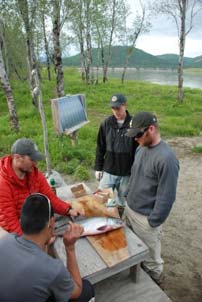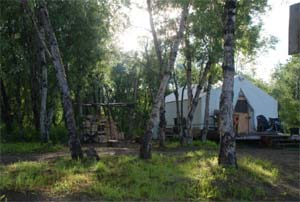Daniel Steel, College Intern II
Commercial Fisheries - Aniak

As a senior at the University of Idaho seeking a Bachelor of Arts degree through the Fisheries Resources program, I was looking for an internship opportunity to gain direct field experience, real world context, and help direct my future career path. As a student and as an avid outdoorsman I had been interested in Alaska's fisheries. During the summer of 2011, I was given the unique opportunity to intern with the Division of Commercial Fisheries, on applied research for the management of Kuskokwim River salmon populations.
My internship proved to be much broader than I expected. When I applied to the ADF&G Internship Program, I was expecting to have an experience similar to that of an entry level fishery technician. I expected to be assigned to a single project and learn basic fisheries field techniques. However, through the application and interview process, I quickly learned that would not be the case. My summer internship was centered on a multi-year "sockeye salmon marked-recapture project", the goal of which was to estimate total return of sockeye salmon to the Kuskokwim River - the second largest river in Alaska. This project is important for a variety of commercial and ecological reasons. The approach was to capture as many sockeye salmon as possible during their upriver migration through the lower reaches of the Kuskokwim River using fish wheels, tag captured fish using external tags, and then recapture tagged fish at weir sites located in upriver tributaries. My primary role was to work as a crew member during the initial capture and tagging portion of the study. However, I was also given the opportunity to participate in other components of Kuskokwim fisheries research and management, such as tag recapture, escapement monitoring, commercial catch sampling, attending management meetings, and discussions with a range of ADF&G biologists.
The base of operations for my internship was a remote field camp located along the mainstem Kuskokwim River, accessible by boat from the small villages of Aniak and Kalskag. We lived and worked from the remote field camp and coordinated supplies through Aniak and Kalskag. Aniak, the larger of the two towns, was where the Kuskokwim Native Association (KNA) and their facilities are located. KNA partners with ADF&G on many of the fisheries projects going on in the basin and we worked side by side with their employees throughout the field season.
After a week of ferrying loads up and down the river, putting wall tents up, some first aid and other training, and construction of the fish wheels, we were finally operational. The fishing was slow at first, which gave me time to see the area, inventory tools, make camp improvements, chop wood, and fish for pike in the nearby sloughs. This down time also gave me the chance to ask questions that I had about the project. I asked any question that I could think of and my constant questioning was met with detailed explanations. The fishing slowly increased and we began to catch different species of fishes in the wheels' most of which were species that I have never encountered before.
This was my first experience with multi-agency research and management. I got to observe a large-scale subsistence fishery being managed, which has influenced my thinking on what constitutes subsistence fishing and how it might be possible to manage the fishery for those who really need it. I got to handle thousands of salmon and whitefish and observe their unique differences. I got to see more of Alaska than some of its residents and I met some of the best fishery biologists in the world.

The list of benefits that I received from this experience goes on and it's something that I recommend to anyone interested in fisheries as a profession. I would encourage applicants to apply to any internship that appeals to them, regardless of its classification. This internship gave me insight into fishery research on a broad perspective, something that a classroom or textbook cannot do. During this internship, I gained a lot of experience that will aid me in many other fishery positions and I have no doubt that this experience has separated me from my peers. If you are serious or just curious about fishery research, this internship will be a cornerstone of your education.
